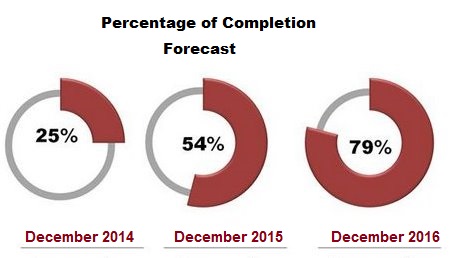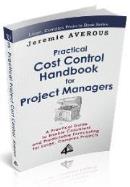Percentage-of-Completion (POC) accounting amplifies any change in the project forecast at completion when it comes to the short term financial results recognition (refer to our previous White Paper 2014-10). In this new White Paper 2014-11 we give Project Managers strategies to manage the time-phasing of their project costs in a way that will avoid as much as possible surprises at the end of the accounting year – thus preserving a trusting relationship with the organization’s executive management.

Your Percentage of Completion forecast at the end of the year is critical to the organization. Make sure your cost time phasing is relevant!
The project cost model must be time-phased month by month for each section of the Cost Breakdown Structure (often called Work Packages). This should be implemented in the Cost Control tool. Downloads from the Cost Control Tool will then feed the financial models.
It is important to review the time phasing on a monthly basis to make sure that costs that are known to slip to the next accounting period (fiscal quarter or year) have effectively been pushed as soon as this information is known. This is critical to ensure the quality of the time-phasing as seen from the financial function, and avoid any unpleasant surprises in the last few weeks of a Quarter the last few months of a Financial Year. The White Paper gives some useful strategies that can be used to minimize the surprise effect of project delays.
As a general observation it is important to be conservative (pessimistic) when it comes to the time-phasing of the cost that will be used as a basis for POC calculation and hence, profit recognition for the accounting period. While not the priority of the Project Manager, she needs to understand the importance of this issue for the organization’s senior management and check that a proper process is in place, together with the relevant awareness of her Cost Control team.
Advice for Project Managers: a good Project Manager is a Project Manager that retains responsibility of projects because she knows how to manage senior management expectations. Don’t give senior management unrealistic expectations as to the profit that could be recognized for your project in this particular year or quarter! Read our new White Paper 2014-11 “How to Manage Properly Project Cost Time-Phasing to Avoid Project Financial Reporting Surprises at the End of the Accounting Year!
Find all these principles of Project Cost Control exposed in a comprehensive manner in our new Handbook,  Practical Project Cost Control for Project Managers (now published – click on the link to see it on Amazon!)
Practical Project Cost Control for Project Managers (now published – click on the link to see it on Amazon!)

